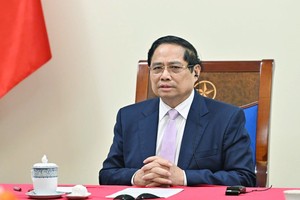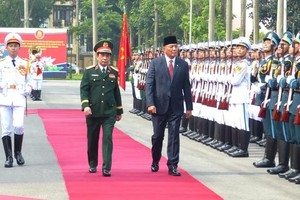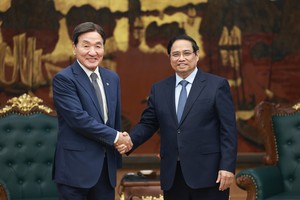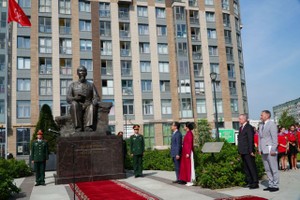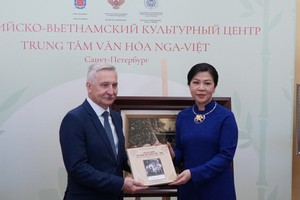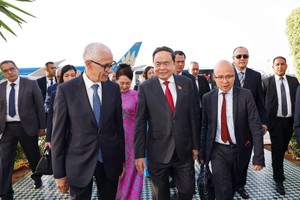US NAVAL BASE AT GUANTANAMO BAY, Cuba (AFP) – Canadian former child soldier Omar Khadr, arrested by US forces in Afghanistan at age 15, pleaded guilty to war crimes in a deal that will see him avoid a life sentence and possibly be returned to Canada.
In a military tribunal at the US naval base at Guantanamo Bay, the Canada-born Khadr admitted to killing a US soldier with a grenade in 2002 during a firefight in Afghanistan, conspiring with Al-Qaeda and building roadside bombs.

During a one hour hearing, military judge Colonel Patrick Parrish read out the five charges against Khadr, including murder in violation of the laws of war, providing material assistance to a terrorist organization and espionage.
Khadr, wearing a suit and tie and holding his bearded face in his hands, replied "yes" when the judge asked if he was pleading guilty on his own free will.
Details of the deal were not immediately disclosed, but the agreement between defense lawyers and US prosecutors is meant to see Khadr, now 24, serve one more year at Guantanamo before returning to Canada to serve seven more years there, according to rights groups and reports.
Khadr is the last Western detainee at Guantanamo.
Parrish said the US administration would support Khadr's repatriation to Canada.
According to the deal, Khadr will be eligible after one year to serve the remainder of his sentence in Canada, and defense attorney Dennis Edney said Ottawa had provided "diplomatic notes" to that effect.
In an interview with the Canadian Broadcasting Corporation, Edney said the Canadian government "came to the table and said it is inclined to agree with the Americans and have Omar back after one year served in Guantanamo Bay. So Omar took that deal."
Canadian Prime Minister Stephen Harper's conservative government had steadfastly refused to seek Khadr's repatriation despite criticism from opposition lawmakers.
Ottawa on Monday would not comment on Khadr's guilty plea, describing it only as "a judicial procedure between Mr. Khadr and the American government."
"The matter is between the US government and Mr. Khadr's lawyers and we have no further comment," Foreign Affairs Minister Lawrence Cannon told the House of Commons.
His spokeswoman Catherine Loubier earlier had no comment to AFP about whether Ottawa was involved in the plea negotiations or if Khadr would eventually be transferred to a Canadian prison.
The judge did not disclose the deal's proposed sentence to the military jury because it will still determine its own sentence at a hearing that begins Tuesday.
The shorter of the two sentences will be applied, said the judge, who added that he intended to make the deal public after the sentence is rendered.
The Miami Herald cited sources as saying that Khadr admitted in the plea that he wanted to kill Americans and Jews in Afghanistan and said his father, an Al-Qaeda operative who was killed in 2003, was part of Osama bin Laden's inner circle.
The US government has said Khadr was the lone survivor of a US bombardment of the compound in eastern Afghanistan, and rose from the rubble to throw a grenade that killed US Sergeant Christopher Speer, before being shot twice in the back by US troops.
Edney said Khadr was "a victim of Canadian politics, of American politics," and that the odds were stacked against his client.
"We didn't expect ever to win, we feel it's a tainted procedure," he told reporters.
"We believe he is innocent but at the end of the day he made the statement that he was guilty of all charges."
Prosecutor John Murphy insisted Khadr was "not a child soldier," but "a murderer convicted by the strength of his own words."
In August, prosecutor Jeff Groharing told the tribunal that Khadr had described himself as "a terrorist praying for Al-Qaeda," and that the youth's intention was "to kill as many Americans" as possible.
His lawyers portrayed him as a frightened boy intimidated by "bad men" who told him what to do, and who afterward was subjected to interrogation techniques that amounted to torture.
Khadr's first US interrogator, at the Bagram base in Afghanistan where Khadr underwent several operations for his wounds, told a military judge in May that he had threatened the boy with tales of rape and murder in US jails to make him talk.
The interrogator was later court martialed for abusing prisoners in Bagram.
Video of an interrogation at the camp released by Khadr's lawyers in 2008 showed the boy sobbing and pleading with Canadian intelligence agents for his release.
Murphy described the plea deal as "an important landmark" for the military commissions, established under president George W. Bush to try terrorism suspects and then revamped under President Barack Obama.
Obama has pledged to close down the Guantanamo prison, a symbol for many of the "war on terror" excesses under Bush. But Obama missed his own January 2010 deadline as he struggles to find an alternative location for the inmates.
Alexander Neve of Amnesty International, one of five rights groups present at the Guantanamo trial, said he deplored the allegations of torture that marred Khadr's case. And while he welcomed Ottawa's apparent agreement to allow Khadr to serve most of his sentence in Canada, "it feels way too little far too late."
